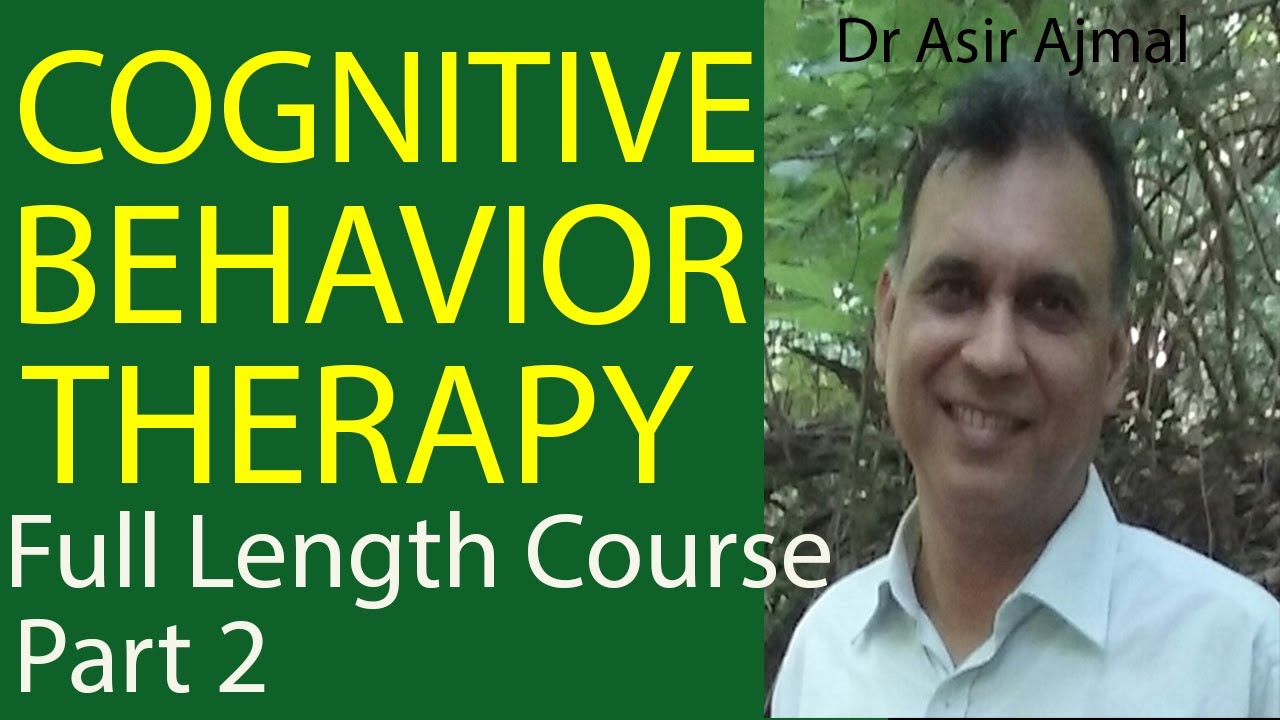Asir Ajmal
Cognitive Behavior Therapy Course Lecture 2 is the second lecture of a full length course by Dr. Asir Ajmal. I discuss CBT case formulation approach and CBT session structure. How to conduct the first session and how to conduct second and subsequent sessions is discussed in detail.
Link for Lecture 1
https://youtu.be/-NsaD2C54kI
Link for full course playlist
CBT Full Course: https://www.youtube.com/playlist?list=PLDGQSZPFZ3O5IzOp7KEDjyUgSBqJC6ud5
Link for anxiety playlist
Anxiety Management: https://www.youtube.com/playlist?list=PLDGQSZPFZ3O5CKQwCCLlTzP0Layq9HD9u
My professional profile:
Dr. Muhammad Asir Ajmal (born January 31, 1962) is the most popular Psychologist in Pakistan. He is hailed as a champion of Sufi Psychology and indigenous theory building. Dr. Asir Ajmal is Professor as well as Director of Psychology Programs at Lahore School of Management, University of Lahore. He is the son of Muhammad Ajmal, the founder of Psychology as an academic discipline in Pakistan and has held his father’s chairmanship at Government College University, Lahore, Psychology Department.
Asir Ajmal is an alumnus of Government College, Lahore and Dartmouth College, USA, and a trained clinical psychologist from NHS, UK. He has taught in various institutions in Pakistan and established departments of psychology in multiple universities. He is best known for developing indigenous perspective in Psychology and initiating qualitative psychological research in Pakistan.
Education
Dr. Asir Ajmal has a PhD in Cognitive Psychology from Dartmouth College, Hanover, NH, USA (1994). He obtained his master’s degree in Psychology in 1984 from Government College, Lahore with a gold medal and roll of honor. During student life, he was active in dramatics and music. He completed post-doctoral work at Teachers College of Columbia University in 1998. In 1999, he went to Britain where he received Statement of Equivalence in Clinical Psychology (2002) and membership of the clinical division of the British Psychological Society.
Career
Asir Ajmal’s career began in Dartmouth College where he worked as teaching assistant from 1985 to 1989 during his doctorate. He spent a year in Nicaragua in 1990, volunteering as a psychologist on a cooperative for mentally retarded adults. He worked as a journalist for The News International and the Muslim (1991 – 1994) while working on his dissertation which he completed in 1994. After nearly a year at Sustainable Development Policy Institute (SDPI) in Islamabad under the great visionary Dr Tariq Banuri, and a brief stint at UPI, he joined Ali Institute of Education (AIE) in 1996 under the equally visionary and great educationist Dr Hamid Kizilbash.
Under Dr Kizilbash’s leadership, he served as head of in-service teacher training program funded by UNDP and conducted teacher training workshops all over rural Punjab and northern areas until 1999. In December 1999, he joined the National Health Service in UK as a clinical psychologist, where he also received on the job training, until 2006 before returning to Pakistan. He served for 7 years in Government College University Lahore as foreign professor.
He was the chairperson of the Department of Psychology at GC University, Lahore from January, 2011 to January 2013. He has had various teaching and administrative positions during his career (Including Virtual University of Pakistan and University of Central Punjab). Currently he is working as Professor of Psychology at University of Lahore.
He also served as visiting faculty at Institute of Business Management, University of Engineering and Technology and Kinnaird College for Women Lahore. In addition, he is a certified leadership trainer and consultant at Franklin Covey Pakistan since May 2014 and runs a private practice and consultancy alongside.
Dr. Ajmal is a vibrant presence in the field of Psychology in Pakistan. He has a huge student following and is revered for his charismatic style, his extensive knowledge and innovative approach. He is also admired by his colleagues for his academic standing, dynamism and commitment.
This channel is devoted to indigenous psychology, psychotherapy, hypnotherapy, music, languages, perennial philosophy and many other things traditional. I want to share many of my interests with everyone and educate those who might be interested.
I seek to use this channel also as a resource for psychology students who may have gaps in their learning of psychotherapy.
I also seek to help those who might be having mental health difficulties and want to help themselves.
I am particularly interested in Muslim Psychology, psychology of poetry, literature, culture and art and will be sharing some discussions on these topics.
I am grateful for free use of the music ” A New Beginning” by Benjamin Tissot. (Music: https://www.bensound.com).
Source




Thank you sir i used your last lecture teachnique of cbt on patient and even shared with colleague. Superb video of class 2
hi
Very nice and exhilaratingly explanation method……. Appreciate you Respected Sir.
very accurate, genuine knowledge in simple language about CBT. dr. salute to your work. make such videos to improve mental health and peoples should not go towards superstition for mental health.
Thankyou sir
I am not a psychology student
..still i have passion about psychology…i also feel anxiety during exams… while surfing YouTube i have come across your videos…i find your videos really helpful… keep making amazing lectures like this… Greetings from India
Sir I am Indian,Sir you are a best advisor,I am very happy after listening your videos. Sir mai ocd aur depresion ka patient hun, bachpan se mughe ocd he, please sir mai therepy lena chahta hun aap mughe bataiye ki therepy kaise lun…… please sir reply….
CBT_2
17.09 एक लड़का है , वो एक दफा इंतिहान में FAIL हो चुका है, VO REPEAT kar raha,
तब जब वो भी, जब भी वह अपनी किताब की तरफ जाता है, तो उसे ANXIETY शुरू हो जाती हैं, और उस ANXIETY के पीछे सोच यह होती है_-
@"कि मैं दोबारा इम्तिहान में FAIL हो गया तो ,क्या होगा?"
और जाहिर है कि उसके साथ
@_तबाही ,बर्बादी सब कुछ खत्म हो जाएगा,
बेड़ा गर्क हो जाएगा ,
वह CATASTROPHIZE करता है,
Catesrophic thinking करता है,
@और जब CATASTROPHIC THINKING करता है तो ANXIETY बढ़ जाती हैं ,
_और जब ANXIETY बढ़ जाती है तो ,
उस ANXIETY से RELIEF पाने के लिए,
वह "किताब" को जो कि "TRIGGER" हैं ANXIETY का ,हटा देता या
खुद STD से बाहर चला जाता है,
किताब को कहीं दूर रख देता है,
और उससे उसे RELIEF मिलता है,
और चुकि उसे RELIEF मिलता है,
_वह अपनी ANXIETY को बर्दाश्त करके,FACE करके पढ़ने के बजाय,
AVOIDANCE इस्तेमाल करता है,
AVOIDANCE jo hai "REINFORCE हो जाती है, उसे "REWARD मिल जाता है,
AVOIDANCE ka RELIEF के सूरत में,
और चुकि उसे RELIEF मिल जाता है, उसे ANXIETY "बर्दाश्त" करने की "आदत" नहीं रहती
और ANXIETY बर्दाश्त करने की आदत "ना" होने का मतलब यह है , उसमें ANXIETY FACE करने की अहलियत( योग्यता, क़ाबिलियत) कम होती चली जाती है,
तो "अगली दफा" फिर TRIGGEE सामने आता है तो phir ab ANXIETY "और बढ़" कर आती है क्योंकि वक्त और कम रह गया है ,इम्तिहान की तैयारी के लिए, toh ANXIETY बहुत ज्यादा सदीद(सख़्त, तेज़ ) होती है,
और उसके लिए फिर वह AVOIDANCE करता है,
AVOID करता है उस किताब को, और उसे फिर RELIEF मिलता है,
_हतता के इम्तिहान सर पर आ जाता है, और अब ANXIETY use मफलूज करती हैं
और वह इंतिहान कि वैसे भी कुछ कर सकता
तय के लिए, अब वह नहीं कर पाता
तो ए एक FUNCTIONAL HYPOTHESIS आप देख रहे हैं जिसमें पहले फ्री डिस्पोजिंग फैक्टर hai, प्रेसिपिटेटिंग फैक्टर या इंसीडेंट है
और प्रपोजेटिंग फैक्टर यानी की मौजूदा सूरते हाल जो चीज है उस प्रॉब्लम को मेंटेन किए हुए हैं,MAINTAINING FACTORS भी कह सकते हैं हम}19.40
Very beautiful explanation. I m a client . I m practice myself CBT.
Many doubts clear. and now I can understand reality vs irrational thoughts. I m practice day by day and results are awesome. Love from India
Nice
Nmste👃 good evening sir very great work.i am from India.God give a long life. Aap kea video very helpful or aasan h.
Ocd me dbai le sakte h I'm indian
Aoa ! Gr8 sir
Sir i am from Bangladesh. How can i interact with you?
Sir I am practicing psychologist and your video is really helpful to using with clients.. thank you so much for this great contribution
sir slides b bna liya karain sath bohat acha tha app ka lecture
Robert carkhuff model is the best which you quoting in first session…
Sir what should be the time limit of each session approximately?
Helpful materials provided by you great Dr sb.
Thank you so much sir
For your lectures . Its very helping for a psychology students . Plz make more videos on psychology related topics .
Cbt2
Cognitions/सोचे
6.20
1.self deprecatory beliefs
अपने बारे में मनफी खयालात/ किसी ना किसी तरह से अपने आप को बुरा कहना
-मैं फैलियर हूं, मैं लूजर हूं ,मैं नाकाम हूं, मैं बदकिस्मत हूं, मैं मनहूस(अशुभ, बुरा।,अभागा, बदकिस्मत) हूं
2.Catastrophizing though
तबाही ,बर्बादी
फला वक्त मेरे साथ यह डिजास्टर हुआ, उसके बाद मेरे साथ वो डिजास्टर हुआ
और अब अगर भला चीज होगी, तो बहुत बड़ा डिजास्टर होगा
सब कुछ खत्म हो जाएगा,बेड़ा गर्क हो जाएगा
3.Low frustration tolerance beliefs
अब मुझ से मजीद बर्दाश्त नहीं हो रहा,
फला चीज तो बिल्कुल मेरे बर्दाश्त से बाहर थी,
फला चीज ने बिल्कुल मेरी कमर तोड़ के रख दी, अब कुछ मजीद हुआ तो मुझसे बर्दाश्त नहीं होगा
4.Demand of self and others
मुझे इतना हंसास(परेशान)नहीं होना चाहिए
Dr क्यों भाई अगर आप हसांस(परेशान) हैं, तो आप हंसास(परेशान) हैं, तो होना नहीं होना चाहिए लगाके आप अपने आप को सिर्फ मजीद अजियत दे रहे हैं, एक रियलिटी डे को एक्सेप्ट करने से इंकार कर रहे है
BazwQkat ye demands jo hai past wishes Ban Jaate Hain- काश मेरा रंग काला ना होता, काश मैं इन पैरंट्स के घर में पैदा ना हुआ होता, मेरे साथ ए सब क्यों हुआ
Wow, great job, never and ever seen before such a awesome explaination
How can I visit your Clinic for your sessions to trat one younger person
Thank you it is very informative and helpful for me
Thanku soo much sir …I feel good when I listen your lectures